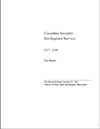2017-18 Fees Report
Canadian Security Intelligence Service
2017 – 2018
Fees Report
Her Majesty the Queen in Right of Canada, 2018
Cat. No.: PS71-2E-PDF
ISSN: 2562-3699
Minister’s message
On behalf of Canadian Security Intelligence Service , I am pleased to present the 2017 to 2018 Report on Fees.
On June 22, 2017, the Service Fees Act received royal assent, thereby repealing the User Fees Act.
The Service Fees Act introduces a modern legislative framework that enables cost-effective delivery of services and, through enhanced reporting to Parliament, improved transparency and oversight. The act provides for:
- a streamlined approach to consultation and the approval of new or modified fees
- a requirement for services to have service standards and reporting against these standards, along with a policy to remit fees to fee payers when standards are not met
- an automatic annual fee adjustment by the Consumer Price Index (CPI) to ensure that fees keep pace with inflation
- annual detailed reporting to Parliament in order to increase transparency.
This 2017 to 2018 Fees Report is the first report to be prepared under the Service Fees Act. The report includes new information such as a detailed listing of all fees along with future year fee amounts. Additional fee information will be included starting next fiscal year, once Public Safety Canada fully transitions to the Service Fees Act regime.
I welcome the increased transparency and oversight that the Service Fees Act’s reporting regime embodies, and I am fully committed to transitioning my department to this modern framework.
The Honourable Ralph Goodale, P.C., M.P.
Minister of Public Safety and Emergency Preparedness
General fees information
The table that follow provides information on the category of fees, including:
- the name of the fee category
- the date that the fee (or fee category) was introduced and last amended (if applicable)
- service standards
- performance results against these standards
- financial information regarding total costs, total revenues and remissions
| Fee category | Fees for processing requests files under the Access to Information Act |
Fee-setting authority |
|
Year introduced |
1983 |
Year last amended |
2018 |
Service standard |
The Department strives to respond to 100% of requests within the legislated timeframes established by the Access to Information Act. |
Performance results |
The department responded within the legislated timeframes for 98.4% of requests*. Thirteen requests were responded to after the legislated timeframe. |
Other information |
On March 31, 2015, the Federal Court of Canada issued its judgment and reasons in Information Commissioner v Attorney General of Canada. The Federal Court ruled that electronic records (i.e. Word documents, emails, etc.) are computerized records, and as such, search and preparation fees cannot be charged for the processing of those records. On May 5, 2016, the Treasury Board of Canada Secretariat established an Interim Directive on the Administration of the Access to Information Act. The directive directs federal officials to waive all fees prescribed by the Access to Information Act and Regulations apart from the $5 filing fee. |
* Includes cases where a Notice of Extension is sent to the requester within 30 days of receipt of the request. |
|
2016 to 2017 Revenue |
2017 to 2018 Revenue |
2017 to 2018 Cost* |
2017 to 2018 Remissions† |
|---|---|---|---|
$1,960 |
$3,425 |
$580,004 |
$2,288 |
* The amount includes direct and indirect costs, where such costs are identifiable and material. † A remission is a partial or full return of a fee paid. Under the Service Fees Act, departments are required to develop policies that determine when fees will be remitted to fee payers should service standards not be met. The requirement for departments to remit is anticipated to come into effect on March 31, 2020. This effective date allows departments time to develop remissions policies and adjust service standard tracking and remittance systems. During fiscal year 2017 to 2018, some departments may have issued remissions, in accordance with the authority of their enabling legislation or regulation, as opposed to the authority given by the Service Fees Act. It is remissions issued under enabling legislations or regulations that are shown above. |
|||
